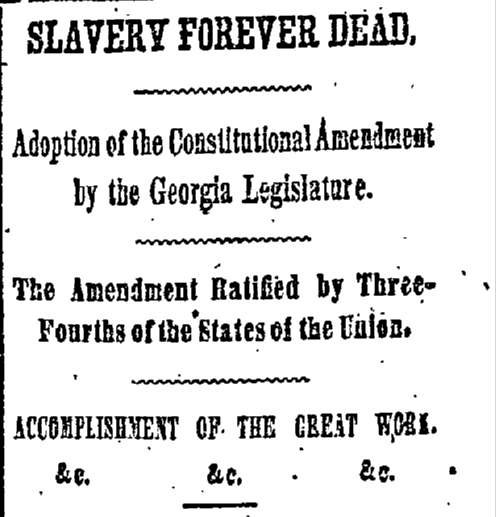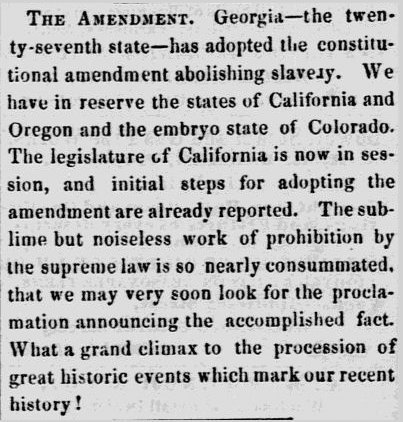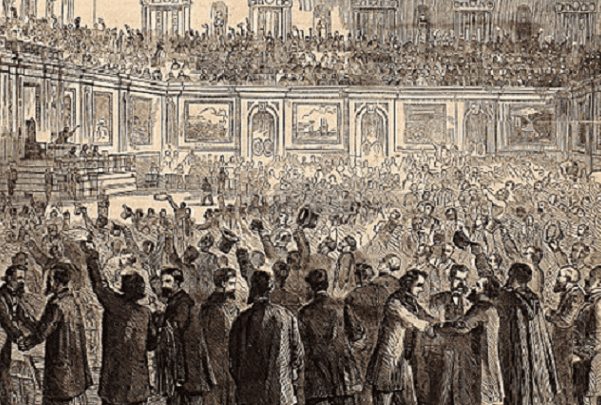Our online archive of old newspapers is a great resource to help with your family history research, filling in details on your family tree. It’s also a good way to learn about the times your ancestors lived in, and better understand their lives.
For example, if your ancestors were alive on Dec. 6, 1865, then you know one of the major news topics they were discussing around the supper table. For on that day, the Thirteenth Amendment to the U.S. Constitution was ratified, forever abolishing slavery in the United States.
The next day, Americans saw in their local newspapers something very similar to what New Yorkers were reading about the newly-ratified constitutional amendment marking the abolition of slavery:

Some people today think President Abraham Lincoln banned slavery when he issued his Emancipation Proclamation during the Civil War, but that was not the case. Using his War Powers, President Lincoln only did what he could legally do: free the slaves in Confederate-controlled parts of the country. Slavery itself remained legal in the U.S.— slaves were not freed in the four border states that did not secede from the Union: Delaware, Kentucky, Maryland and Missouri.
It would take an amendment to the U.S. Constitution to legally ban slavery in the United States, and when the Georgia Legislature approved the 13th Amendment—becoming the 27th state to do so—the necessary approval of ¾ of the states was reached and the amendment was ratified.

The American Civil War was fought over two main preservation issues: whether the Union should remain intact, and whether slavery should be preserved. After four terrible years of military fighting that killed over 600,000 soldiers and wounded hundreds of thousands more, the nation had its answers: the Union would remain whole, and slavery was ended.
What a tumultuous year 1865 was for America! At the beginning of the year the Civil War was still raging. During April General Robert E. Lee surrendered the main Confederate army—and five days later U.S. President Abraham Lincoln was assassinated by a Southern sympathizer. By that summer the fighting had ended and the American Civil War was finally over.
And all during that long year the process of ratifying the 13th Amendment to ban slavery in America was slowly winding its way through the state ratification process. While this was of great interest to all Americans, of course, it is safe to say the outcome of the constitutional amendment’s ratification was especially important to African Americans, as the following three newspaper articles show (all from GenealogyBank’s African American Newspaper Archives).
This newspaper article was published on the day President Lincoln died, and reminds its African American audience that ending the Civil War and freeing the slaves is but a first step toward a society where all members are free, educated, and equal participants with full legal protections. The old newspaper article warns that it is prejudice itself that must be overcome:
There are many remnants of the past guilt yet polluting the soil and the atmosphere. There are cruel and dangerous prejudices that must be outlived. The sting of the serpent of slavery is in the hearts of the people. They may die with it, but justice and righteousness will live forever, and with them we must and shall succeed.
These are powerful words in an African American newspaper from South Carolina—the first state that seceded from the Union and where the Civil War’s first battle was fought—published just months after the war ended. The historical newspaper article goes on to say:
We are confident of a change, because satisfied that the present policy is a failure. No cause can long prevail unless founded in absolute justice to all men. With such implicit faith in the justice of our cause, let us give our unqualified support to the President, and press steadily on for the accomplishment of the great purposes of our country—the moral rights, the intellectual privileges, and the physical liberties of mankind.
At the end of December 1865, following ratification of the 13th Amendment, this newspaper article was published with the title “What Is a Man?”
This old newspaper article concludes with these stirring words:
But these laws are dead, and we are glad of it. Fate has torn down the shutters and broken the locks of the temple of knowledge, and the great problem of advancement has commenced, and if, in its solution, it should give birth to men in the full sense of the term; we hope and trust that the boundary lines of color and race shall be obliterated from the map of common sense, and every man shall stand on his own merits as a man, and the world shall behold the consummation of the poet’s [i.e., Robert Burns] highest hope, that
Man to man the world o’er
Shall brothers be, an’ a’ that.
Good luck with your family history research, and enjoy browsing through historical newspaper archives such as the ones GenealogyBank offers. You’ll find many details, and possibly even maps, photographs or other illustrations, to learn more about your ancestors—and the times they lived in.
If you are researching your black American ancestry you may find our special African American Newspaper Archives to be particularly helpful.
